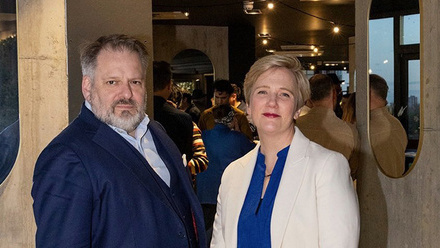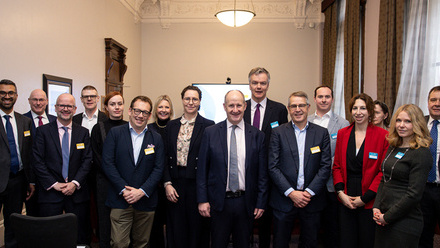UK risks falling behind France in race for scientific investment, say business leaders
Jeremy Hunt’s ambition to turn Britain into a “science superpower” is at risk unless he increases tax relief to attract private investment for the development of scientific breakthroughs, industry has warned ahead of this month’s Autumn Statement.
Last year Chancellor Jeremy Hunt said he wanted to turn the UK into "the world's next Silicon Valley" and described science and technology as an "engine for growth”.
However, Government incentives that have historically rewarded investments in innovative companies, such as R&D tax relief, are no longer providing UK firms with the same support.
Recent reductions in Research and Development (R&D) tax incentives means an estimated £1 billion per year in relief is no longer available for businesses, making it less attractive for investors to fund innovative early-stage UK companies developing new technology.
These changes have seen the UK’s rate of tax credits for R&D investment by smaller companies fall to 19p for every £1 invested, or 27p for a sub-set of “R&D intensive” companies.
This means that the UK now lags behind its competitors, including France, which offers 30p in every £1 invested in R&D, and behind Australia which offers 45p.
In addition, the future of the UK’s Enterprise Investment Scheme (EIS) and Venture Capital Trust (VCT) schemes is in doubt. These schemes have incentivised investment into early-stage trading companies, fostering some of the UK’s most innovative companies.
The extension of the schemes is critical to the contribution of the science and technology sector to economic growth and will be an essential element in achieving the Government’s aim of making the UK a science superpower.
Members of the BVCA (British Private Equity and Venture Capital Association), the trade body for UK Private Equity and Venture Capital, have also said that there is inconsistency in the Government’s approach to the allocation of R&D tax credits, causing uncertainty for businesses. Others have cited a slow response from the tax authority and have highlighted cases involving payments which were delayed to such an extent that businesses were forced to make redundancies.
Early-stage businesses need to be able to produce financial plans that extend several years into the future. Recent reductions in the availability of R&D relief were made at short notice, effectively pulling the rug out from beneath businesses’ feet.
Investors are also being deterred from backing high-growth companies by the uncertainty over the future of the EIS and VCT schemes.
Whilst the Government has made promises to extend the EIS and VCT schemes, this does not go far enough. The UK rule book still provides that the schemes will end in April 2025: a so-called “sunset clause”. This has created an uncertain environment for UK firms and investors, who are making decisions now about their investments over the next 12-18 months. Without certainty around these schemes, the Chancellor risks jeopardising long-term investment in technology and at the same time making the UK a less attractive place to invest.
Whilst the UK remains the largest hub for Venture Capital (VC) investment outside of the USA, a number of European countries are seeing levels of Venture Capital investment increasing rapidly.
For example, France has introduced several incentives – such as the TIBI scheme - to encourage investment into early-stage businesses. A recent report from Dealroom.co reveals that France has seen a 40% increase in investment.
The BVCA is therefore calling on the Chancellor to:
- increase tax relief for R&D investment by innovative early-stage companies;
- give businesses the stability and certainty they need by ensuring that R&D claims are processed quickly and fairly; and
- remove sunset clauses altogether from the EIS and VCT schemes, to provide certainty for investors and the innovative companies they support.
Michael Moore, Chief Executive of the BVCA, said:
“Britain is one of the greatest places to setup and start a business, which is why so many world-changing technological innovations and scientific discoveries are made here.
Having access to the capital early-stage businesses need is therefore critical, which is why we are urging the Chancellor to remove the sunset clauses from the EIS and VCT schemes and to increase tax relief for R&D investment.”
The BVCA welcomed the pension reforms as set out in the Chancellor’s Mansion House speech in July, which will not only boost UK pensions but also unlock additional capital for the most innovative UK businesses. Whilst we have seen the VC community rally to support the pension industry through the Venture Capital Investment Compact, the benefits may not be seen for several years.
Seb Wallace, co-founder of Further, a B2B software business, said:
“The EIS and VCT schemes are a bedrock of early-stage UK venture capital. A company that would raise £20,000 from a funder frequently raises £50,000 or £100,000 from the same source when these schemes are available. This magnitude of difference in available capital is a key reason why the UK is the standout exception in Europe when it comes to the capital available to early-stage startups. If the UK lost these schemes, the detriment to the ecosystem is hard to comprehend. Certainty is urgently needed, to give young businesses assurance that they can continue to trade and grow with this capital at their disposal. If not, we soon risk a cutback in startup expenditure, and consequent slower growth across the sector.”
Christiana Stewart-Lockhart, Director General of the Enterprise Investment Scheme Association, said:
“The EIS is absolutely critical for entrepreneurs, across the whole of the UK, and certainty around its future beyond the sunset clause could give a real boost to start-ups looking to raise investment now and in the near future. The current challenge is that it is difficult for entrepreneurs to plan for the next ~3 years without the certainty that the EIS would be available for their next fund raise. Typically, start-ups have an 18-month cash runway and that takes us past the current end to the EIS. The next fiscal event in November provides the Government with a great opportunity to boost confidence and investment in these early-stage businesses, by providing further details around an extension to the world-leading Enterprise Investment Scheme.”
Stephen Nundy, Partner & Chief Technology Officer at Lakestar, said:
“The UK’s scientific and technological capabilities rely on ground-breaking early-stage companies - especially in today's fast paced world of AI. Historically, tax relief for cutting-edge R&D has supported the development of new technologies whilst ensuring innovative companies, jobs, and skills scale in the UK. Startups need to operate in a stable and predictable environment, however, the recent changes to R&D tax credits, alongside delays in refunds being actioned, have created uncertainty among founders. Reaffirming the long-term commitment to these schemes would underline the UK's ambition to be to lead in science and technology by 2030.”
Contact
For media enquiries, please contact:
Karen Keany, External Communications Manager, BVCA: [email protected]
Notes to editors
About the British Private Equity & Venture Capital Association (BVCA)
The BVCA is the industry body and public policy advocate for the private equity (PE) and venture capital (VC) (private capital) industry in the UK. With a membership of around 650 firms, we represent the vast majority of all UK-based private capital firms, as well as their professional advisers and a large base of UK and global investors.
In 2022, £27.5bn was invested by private capital into UK businesses in sectors across the UK economy, ranging from consumer products to emerging technology. There are over 12,000 UK companies backed by private capital which currently employ over 2.2 million people in the UK. Over 55% of the businesses backed are outside of London and 90% of the businesses receiving investment are small and medium-sized businesses.
Mansion House Compact:
In July 2023, nine of the UK’s largest defined contribution (DC) pension providers voluntarily pledged to allocate 5 per cent of assets in their default funds to unlisted equities by 2030, as part of a new agreement, the Mansion House Compact.
The Mansion House Compact members are: Aviva, Scottish Widows, L&G, Aegon, Phoenix, Nest, Smart Pension, M&G and Mercer.
Venture Capital Investment Compact:
In October 2023, Twenty of the UK’s leading Venture Capital (VC) and Growth Equity firms signed the Venture Capital Investment Compact pledging to support efforts to unlock British pension investment in high-growth companies.
Convened by the British Private Equity and Venture Capital Association (BVCA), the Compact commits signatories to working closely with the pension funds which were enlisted in the Government’s Mansion House agreement.





